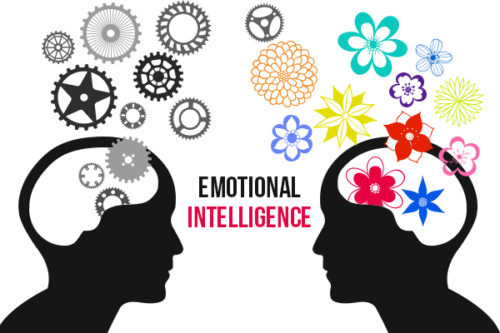
EMOTIONAL INTELLIGENCE IS NEW INTELLIGENCE
Daniel Goleman argues that IQ is not everything, our current view of intelligence is too narrow. Ignoring important abilities that determine how well we do in life. The superior metric that Goleman prefers to use to measure life success is EQ otherwise known as Emotional Intelligence.
It is made of 5 things.
1. Self Awareness- this is knowing one’s emotions as they happen. If you can do this you’ll make better decisions.
2. Managing Emotions- This is the ability to handle feelings. People that can manage their emotions are good at bouncing back from setbacks in life
3. Self Motivation- 4. Empathy- this is recognizing emotions and others. This is the people skill that makes people better at teaching sales and Management.
5. Handling Relationships- these abilities lead to popularity leadership and interpersonal effectiveness.
So, how do we improve our emotional intelligence. Goleman offers various insights throughout the book. Let’s go over the ones that I found the most useful and I think you will too.

Lesson 1:
The Ventilation Fallacy:
Venting when you are angry prolongs your mood rather than ending it. Goleman along with multiple studies argues that venting your anger doesn’t make you feel better, but instead prolongs and amplifies your anger. It pumps up the emotional Brain’s arousal and leaves people feeling more angry. Don’t get confused though venting when you are sad can be great way to get your feelings validated , but isn’t as effective when you are angry.
So when you feel yourself becoming angry what can you do to control your anger.
- Take few deep breaths to help you relax and slow your heart rate, this helps your body go from high arousal to low arousal.
- Go for a walk, but don’t indulge into anger inducing thoughts.
- As bad thoughts come to you write them down and then reframe them.

Lesson 2:
Don’t ruminate when you are sad, distract yourself instead.:
A saleswoman gets depressed and spent so many hours worrying about it that she doesn’t get important sales call. Her sales making her feel like a failure which feeds her depression. But if she reacted to depression by trying to distract herself. She might plunge into the sales calls as a way to get her mind off the sadness. Sales would less likely to decline and the very experience of making a sale might boost their self confidence, lessening their depression somewhat.
What Goleman trying to say here? Is that continuing to think negative thoughts will lead you deeper into the sadness. Distractions are what break the chain of sadness maintaining thinking, the best distractions are ones that will shift your moods such as funny movie, reading an uplifting book or going to an exciting sport event. Goleman says distractions are more effective than crying because crying often reinforces rumination and prolongs misery.
Goleman offers 4 more solutions to managing sadness.
- Exercise: Aerobic exercise is good because it changes your physiological state. Depression is a low arousal state, an aerobic exercise counters up by putting you into a high arousal state.
- Go for that easy success. Do that small tasks that you have been putting off for a while and reap the rewards.
- Reframe the situation- Just like with anger take note of bad thoughts when they come to you and see them in a more positive light. What can I learn form it. There are few things which would never happen if you didn’t change your thinking.
- Lastly help other in need. It helps us to empathize with others and lifts us out of negativity.

Lesson 3:
The Artful Critique.
How to criticize the right way. Criticism is important in how it is given. It determines how satisfied people are with their work with those when they work with and those who are responsible.
One of the worst criticisms are if you’re managing people is to say “you’re screwing up” delivered in Harsh sarcastic angry tone. It provided neither a chance nor any suggestions of ho to do things better, It ignores the person’s feelings and leave them feeling helpless and angry.
Much more effective way to criticize would be to say the main difficulty at this stage is that your plan will take too long and so escalates the cost, I would like you to think more about your proposal to see if you could do your job more quickly. This gives them hope of doing better and suggest the beginning of a plan to do so.
Goleman says you need four things to successfully deliver constructive criticism. They are
- Be specific.
- Offer a solution.
- Do it face to face.
- Be sensitive by showing empathy.

Lesson 4:
Emotional Contagion set the emotional tone.
So in a simple experiment two volunteers filled out a checklist about their merits at the moment and then started facing each other quietly waiting for the experiments to return to the room , two minute later, they returned and asked him to fill out the mood checklist again.
The pair’s were purposely chosen so that one partner was highly expressive of emotion and one who appeared flat and expressionless. It turns out that the mood of the expressive person had been transferred to the expressionless person.
This is an example of emotional contagion, our emotions are contagious like a virus they spread through others, this is why speakers like Tony Robbins are able to hype up their audience and get them involved. They show their passion and energy which spreads through the audience like wildfire.
Goleman says this ability to drive the emotional state and another person through emotional contagion is at the hearth of influencing people whether that’s through speaking teaching singing or in any other interpersonal communication.



[…] to learn more about how you could achieve Emotional Health. Do checkout these links.Beyond IQ, Emotional Intelligence is the new Intelligence. 4 ways to make your Life better.Ikigai: The Japanese Secret to a Long and Happy life.(10 points we can learn from IKIGAI).Why has […]
[…] to learn more about how you could achieve Emotional Health. Do checkout these links.Beyond IQ, Emotional Intelligence is the new Intelligence. 4 ways to make your Life better.Ikigai: The Japanese Secret to a Long and Happy life.(10 points we can learn from IKIGAI).Why has […]